Personal Effectiveness Paper: Food Security and Obesity in Nigeria
VerifiedAdded on 2021/01/08
|15
|3802
|98
Report
AI Summary
This personal effectiveness paper delves into the critical issue of food security in Nigeria, particularly focusing on the rising problem of obesity as a result of nutritional imbalance. The paper highlights the challenges posed by the decline in the agricultural sector, lack of awareness about balanced diets, and the preference for unhealthy, processed foods. It examines the role of The Obesity Society of Nigeria (TOSN) in addressing this hidden food security crisis and emphasizes the importance of educating the public about healthy eating habits and calorie management. The author explores feedback from various sources, including peers, TOSN team members, and community members, to understand the socio-economic, cultural, and behavioral factors influencing food choices. The paper proposes strategies such as government regulations on processed foods, school food policies, and increased public awareness campaigns to promote balanced diets and reduce obesity. The author reflects on their learning agenda, identifying communication, analytical, and research skills as essential for addressing the issue and suggests further steps to enhance their knowledge and effectiveness in the field of public health. The paper also outlines new behavioral practices to combat obesity and promote healthy living in Nigeria.
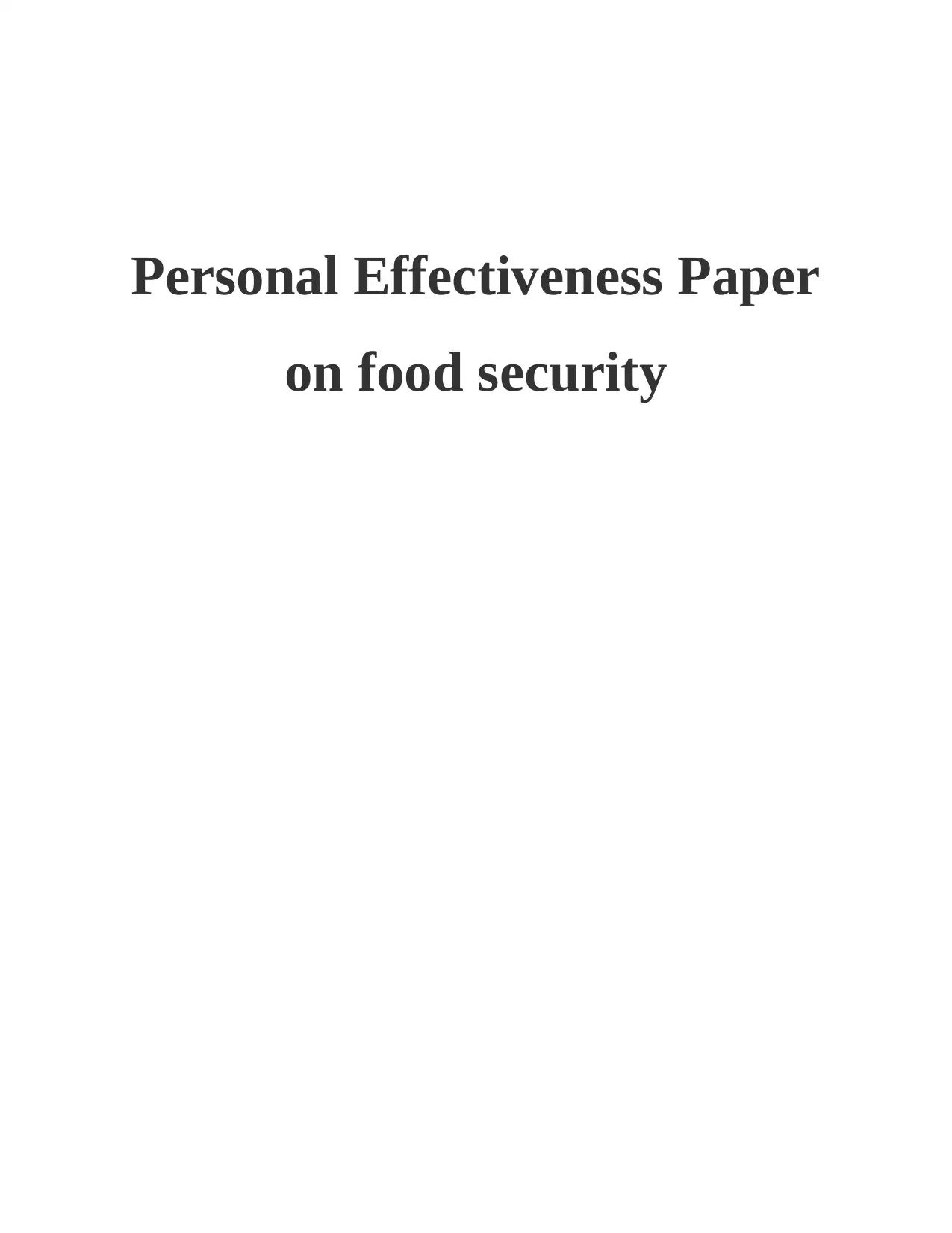
Personal Effectiveness Paper
on food security
on food security
Paraphrase This Document
Need a fresh take? Get an instant paraphrase of this document with our AI Paraphraser
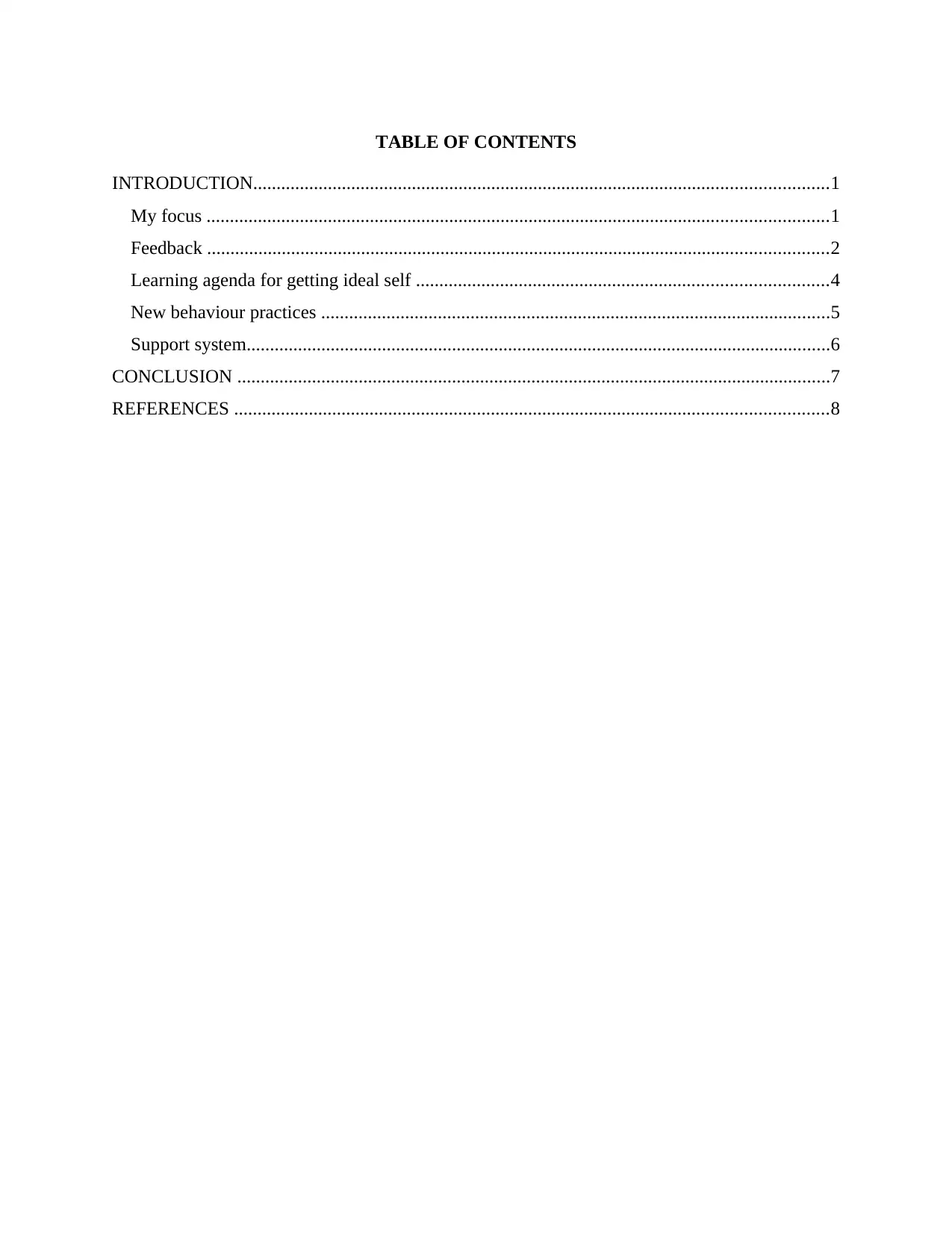
TABLE OF CONTENTS
INTRODUCTION...........................................................................................................................1
My focus .....................................................................................................................................1
Feedback .....................................................................................................................................2
Learning agenda for getting ideal self ........................................................................................4
New behaviour practices .............................................................................................................5
Support system.............................................................................................................................6
CONCLUSION ...............................................................................................................................7
REFERENCES ...............................................................................................................................8
INTRODUCTION...........................................................................................................................1
My focus .....................................................................................................................................1
Feedback .....................................................................................................................................2
Learning agenda for getting ideal self ........................................................................................4
New behaviour practices .............................................................................................................5
Support system.............................................................................................................................6
CONCLUSION ...............................................................................................................................7
REFERENCES ...............................................................................................................................8
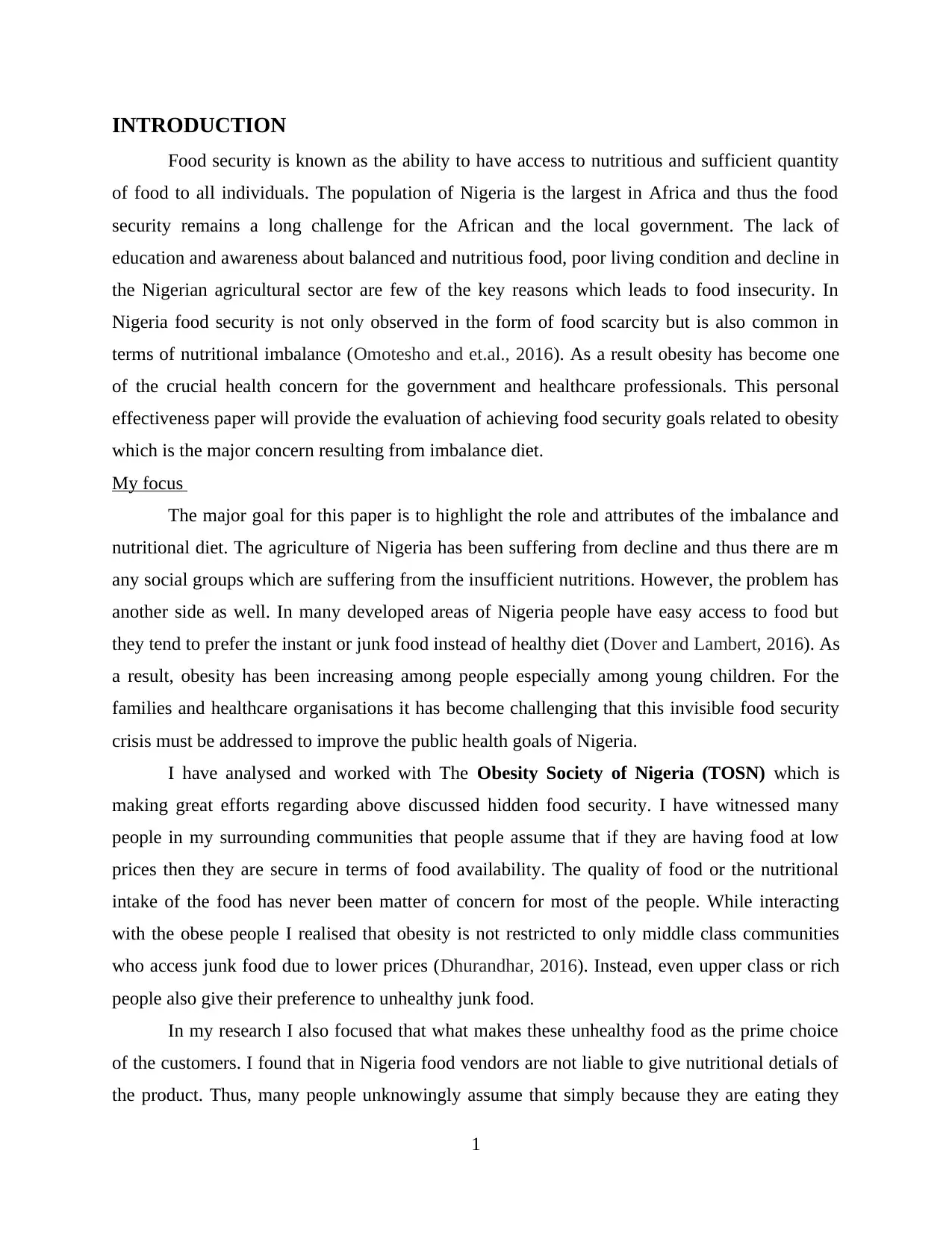
INTRODUCTION
Food security is known as the ability to have access to nutritious and sufficient quantity
of food to all individuals. The population of Nigeria is the largest in Africa and thus the food
security remains a long challenge for the African and the local government. The lack of
education and awareness about balanced and nutritious food, poor living condition and decline in
the Nigerian agricultural sector are few of the key reasons which leads to food insecurity. In
Nigeria food security is not only observed in the form of food scarcity but is also common in
terms of nutritional imbalance (Omotesho and et.al., 2016). As a result obesity has become one
of the crucial health concern for the government and healthcare professionals. This personal
effectiveness paper will provide the evaluation of achieving food security goals related to obesity
which is the major concern resulting from imbalance diet.
My focus
The major goal for this paper is to highlight the role and attributes of the imbalance and
nutritional diet. The agriculture of Nigeria has been suffering from decline and thus there are m
any social groups which are suffering from the insufficient nutritions. However, the problem has
another side as well. In many developed areas of Nigeria people have easy access to food but
they tend to prefer the instant or junk food instead of healthy diet (Dover and Lambert, 2016). As
a result, obesity has been increasing among people especially among young children. For the
families and healthcare organisations it has become challenging that this invisible food security
crisis must be addressed to improve the public health goals of Nigeria.
I have analysed and worked with The Obesity Society of Nigeria (TOSN) which is
making great efforts regarding above discussed hidden food security. I have witnessed many
people in my surrounding communities that people assume that if they are having food at low
prices then they are secure in terms of food availability. The quality of food or the nutritional
intake of the food has never been matter of concern for most of the people. While interacting
with the obese people I realised that obesity is not restricted to only middle class communities
who access junk food due to lower prices (Dhurandhar, 2016). Instead, even upper class or rich
people also give their preference to unhealthy junk food.
In my research I also focused that what makes these unhealthy food as the prime choice
of the customers. I found that in Nigeria food vendors are not liable to give nutritional detials of
the product. Thus, many people unknowingly assume that simply because they are eating they
1
Food security is known as the ability to have access to nutritious and sufficient quantity
of food to all individuals. The population of Nigeria is the largest in Africa and thus the food
security remains a long challenge for the African and the local government. The lack of
education and awareness about balanced and nutritious food, poor living condition and decline in
the Nigerian agricultural sector are few of the key reasons which leads to food insecurity. In
Nigeria food security is not only observed in the form of food scarcity but is also common in
terms of nutritional imbalance (Omotesho and et.al., 2016). As a result obesity has become one
of the crucial health concern for the government and healthcare professionals. This personal
effectiveness paper will provide the evaluation of achieving food security goals related to obesity
which is the major concern resulting from imbalance diet.
My focus
The major goal for this paper is to highlight the role and attributes of the imbalance and
nutritional diet. The agriculture of Nigeria has been suffering from decline and thus there are m
any social groups which are suffering from the insufficient nutritions. However, the problem has
another side as well. In many developed areas of Nigeria people have easy access to food but
they tend to prefer the instant or junk food instead of healthy diet (Dover and Lambert, 2016). As
a result, obesity has been increasing among people especially among young children. For the
families and healthcare organisations it has become challenging that this invisible food security
crisis must be addressed to improve the public health goals of Nigeria.
I have analysed and worked with The Obesity Society of Nigeria (TOSN) which is
making great efforts regarding above discussed hidden food security. I have witnessed many
people in my surrounding communities that people assume that if they are having food at low
prices then they are secure in terms of food availability. The quality of food or the nutritional
intake of the food has never been matter of concern for most of the people. While interacting
with the obese people I realised that obesity is not restricted to only middle class communities
who access junk food due to lower prices (Dhurandhar, 2016). Instead, even upper class or rich
people also give their preference to unhealthy junk food.
In my research I also focused that what makes these unhealthy food as the prime choice
of the customers. I found that in Nigeria food vendors are not liable to give nutritional detials of
the product. Thus, many people unknowingly assume that simply because they are eating they
1
⊘ This is a preview!⊘
Do you want full access?
Subscribe today to unlock all pages.

Trusted by 1+ million students worldwide
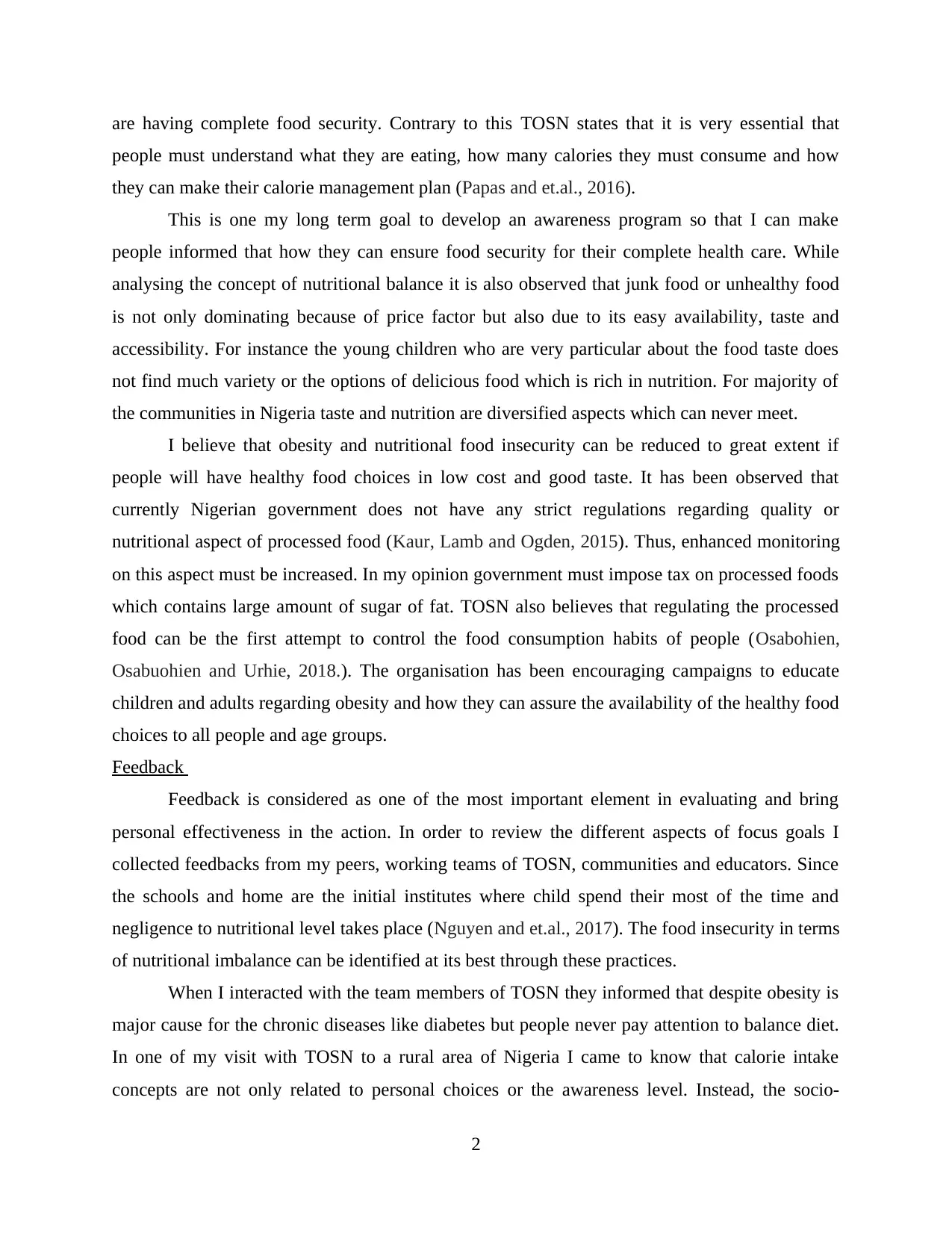
are having complete food security. Contrary to this TOSN states that it is very essential that
people must understand what they are eating, how many calories they must consume and how
they can make their calorie management plan (Papas and et.al., 2016).
This is one my long term goal to develop an awareness program so that I can make
people informed that how they can ensure food security for their complete health care. While
analysing the concept of nutritional balance it is also observed that junk food or unhealthy food
is not only dominating because of price factor but also due to its easy availability, taste and
accessibility. For instance the young children who are very particular about the food taste does
not find much variety or the options of delicious food which is rich in nutrition. For majority of
the communities in Nigeria taste and nutrition are diversified aspects which can never meet.
I believe that obesity and nutritional food insecurity can be reduced to great extent if
people will have healthy food choices in low cost and good taste. It has been observed that
currently Nigerian government does not have any strict regulations regarding quality or
nutritional aspect of processed food (Kaur, Lamb and Ogden, 2015). Thus, enhanced monitoring
on this aspect must be increased. In my opinion government must impose tax on processed foods
which contains large amount of sugar of fat. TOSN also believes that regulating the processed
food can be the first attempt to control the food consumption habits of people (Osabohien,
Osabuohien and Urhie, 2018.). The organisation has been encouraging campaigns to educate
children and adults regarding obesity and how they can assure the availability of the healthy food
choices to all people and age groups.
Feedback
Feedback is considered as one of the most important element in evaluating and bring
personal effectiveness in the action. In order to review the different aspects of focus goals I
collected feedbacks from my peers, working teams of TOSN, communities and educators. Since
the schools and home are the initial institutes where child spend their most of the time and
negligence to nutritional level takes place (Nguyen and et.al., 2017). The food insecurity in terms
of nutritional imbalance can be identified at its best through these practices.
When I interacted with the team members of TOSN they informed that despite obesity is
major cause for the chronic diseases like diabetes but people never pay attention to balance diet.
In one of my visit with TOSN to a rural area of Nigeria I came to know that calorie intake
concepts are not only related to personal choices or the awareness level. Instead, the socio-
2
people must understand what they are eating, how many calories they must consume and how
they can make their calorie management plan (Papas and et.al., 2016).
This is one my long term goal to develop an awareness program so that I can make
people informed that how they can ensure food security for their complete health care. While
analysing the concept of nutritional balance it is also observed that junk food or unhealthy food
is not only dominating because of price factor but also due to its easy availability, taste and
accessibility. For instance the young children who are very particular about the food taste does
not find much variety or the options of delicious food which is rich in nutrition. For majority of
the communities in Nigeria taste and nutrition are diversified aspects which can never meet.
I believe that obesity and nutritional food insecurity can be reduced to great extent if
people will have healthy food choices in low cost and good taste. It has been observed that
currently Nigerian government does not have any strict regulations regarding quality or
nutritional aspect of processed food (Kaur, Lamb and Ogden, 2015). Thus, enhanced monitoring
on this aspect must be increased. In my opinion government must impose tax on processed foods
which contains large amount of sugar of fat. TOSN also believes that regulating the processed
food can be the first attempt to control the food consumption habits of people (Osabohien,
Osabuohien and Urhie, 2018.). The organisation has been encouraging campaigns to educate
children and adults regarding obesity and how they can assure the availability of the healthy food
choices to all people and age groups.
Feedback
Feedback is considered as one of the most important element in evaluating and bring
personal effectiveness in the action. In order to review the different aspects of focus goals I
collected feedbacks from my peers, working teams of TOSN, communities and educators. Since
the schools and home are the initial institutes where child spend their most of the time and
negligence to nutritional level takes place (Nguyen and et.al., 2017). The food insecurity in terms
of nutritional imbalance can be identified at its best through these practices.
When I interacted with the team members of TOSN they informed that despite obesity is
major cause for the chronic diseases like diabetes but people never pay attention to balance diet.
In one of my visit with TOSN to a rural area of Nigeria I came to know that calorie intake
concepts are not only related to personal choices or the awareness level. Instead, the socio-
2
Paraphrase This Document
Need a fresh take? Get an instant paraphrase of this document with our AI Paraphraser
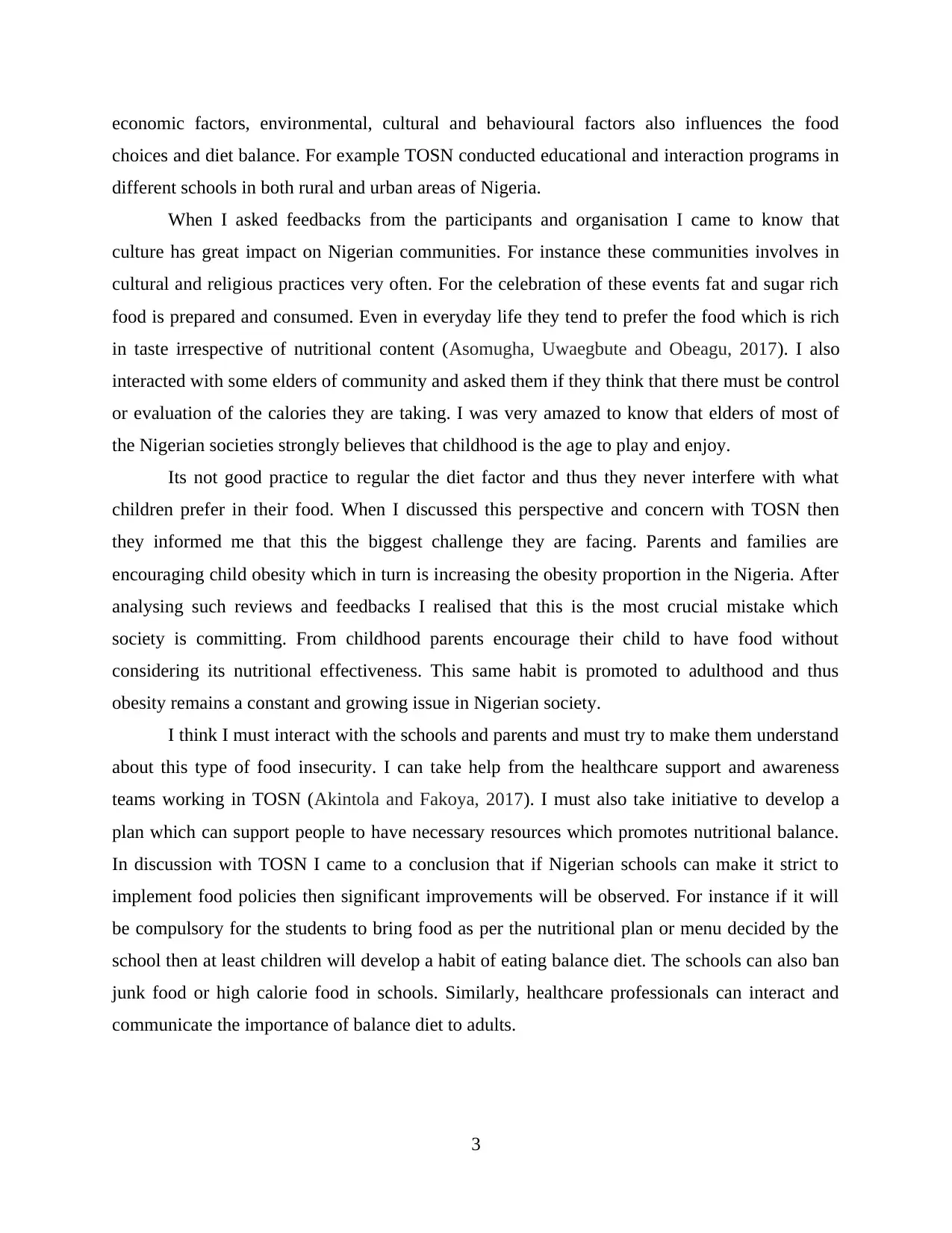
economic factors, environmental, cultural and behavioural factors also influences the food
choices and diet balance. For example TOSN conducted educational and interaction programs in
different schools in both rural and urban areas of Nigeria.
When I asked feedbacks from the participants and organisation I came to know that
culture has great impact on Nigerian communities. For instance these communities involves in
cultural and religious practices very often. For the celebration of these events fat and sugar rich
food is prepared and consumed. Even in everyday life they tend to prefer the food which is rich
in taste irrespective of nutritional content (Asomugha, Uwaegbute and Obeagu, 2017). I also
interacted with some elders of community and asked them if they think that there must be control
or evaluation of the calories they are taking. I was very amazed to know that elders of most of
the Nigerian societies strongly believes that childhood is the age to play and enjoy.
Its not good practice to regular the diet factor and thus they never interfere with what
children prefer in their food. When I discussed this perspective and concern with TOSN then
they informed me that this the biggest challenge they are facing. Parents and families are
encouraging child obesity which in turn is increasing the obesity proportion in the Nigeria. After
analysing such reviews and feedbacks I realised that this is the most crucial mistake which
society is committing. From childhood parents encourage their child to have food without
considering its nutritional effectiveness. This same habit is promoted to adulthood and thus
obesity remains a constant and growing issue in Nigerian society.
I think I must interact with the schools and parents and must try to make them understand
about this type of food insecurity. I can take help from the healthcare support and awareness
teams working in TOSN (Akintola and Fakoya, 2017). I must also take initiative to develop a
plan which can support people to have necessary resources which promotes nutritional balance.
In discussion with TOSN I came to a conclusion that if Nigerian schools can make it strict to
implement food policies then significant improvements will be observed. For instance if it will
be compulsory for the students to bring food as per the nutritional plan or menu decided by the
school then at least children will develop a habit of eating balance diet. The schools can also ban
junk food or high calorie food in schools. Similarly, healthcare professionals can interact and
communicate the importance of balance diet to adults.
3
choices and diet balance. For example TOSN conducted educational and interaction programs in
different schools in both rural and urban areas of Nigeria.
When I asked feedbacks from the participants and organisation I came to know that
culture has great impact on Nigerian communities. For instance these communities involves in
cultural and religious practices very often. For the celebration of these events fat and sugar rich
food is prepared and consumed. Even in everyday life they tend to prefer the food which is rich
in taste irrespective of nutritional content (Asomugha, Uwaegbute and Obeagu, 2017). I also
interacted with some elders of community and asked them if they think that there must be control
or evaluation of the calories they are taking. I was very amazed to know that elders of most of
the Nigerian societies strongly believes that childhood is the age to play and enjoy.
Its not good practice to regular the diet factor and thus they never interfere with what
children prefer in their food. When I discussed this perspective and concern with TOSN then
they informed me that this the biggest challenge they are facing. Parents and families are
encouraging child obesity which in turn is increasing the obesity proportion in the Nigeria. After
analysing such reviews and feedbacks I realised that this is the most crucial mistake which
society is committing. From childhood parents encourage their child to have food without
considering its nutritional effectiveness. This same habit is promoted to adulthood and thus
obesity remains a constant and growing issue in Nigerian society.
I think I must interact with the schools and parents and must try to make them understand
about this type of food insecurity. I can take help from the healthcare support and awareness
teams working in TOSN (Akintola and Fakoya, 2017). I must also take initiative to develop a
plan which can support people to have necessary resources which promotes nutritional balance.
In discussion with TOSN I came to a conclusion that if Nigerian schools can make it strict to
implement food policies then significant improvements will be observed. For instance if it will
be compulsory for the students to bring food as per the nutritional plan or menu decided by the
school then at least children will develop a habit of eating balance diet. The schools can also ban
junk food or high calorie food in schools. Similarly, healthcare professionals can interact and
communicate the importance of balance diet to adults.
3
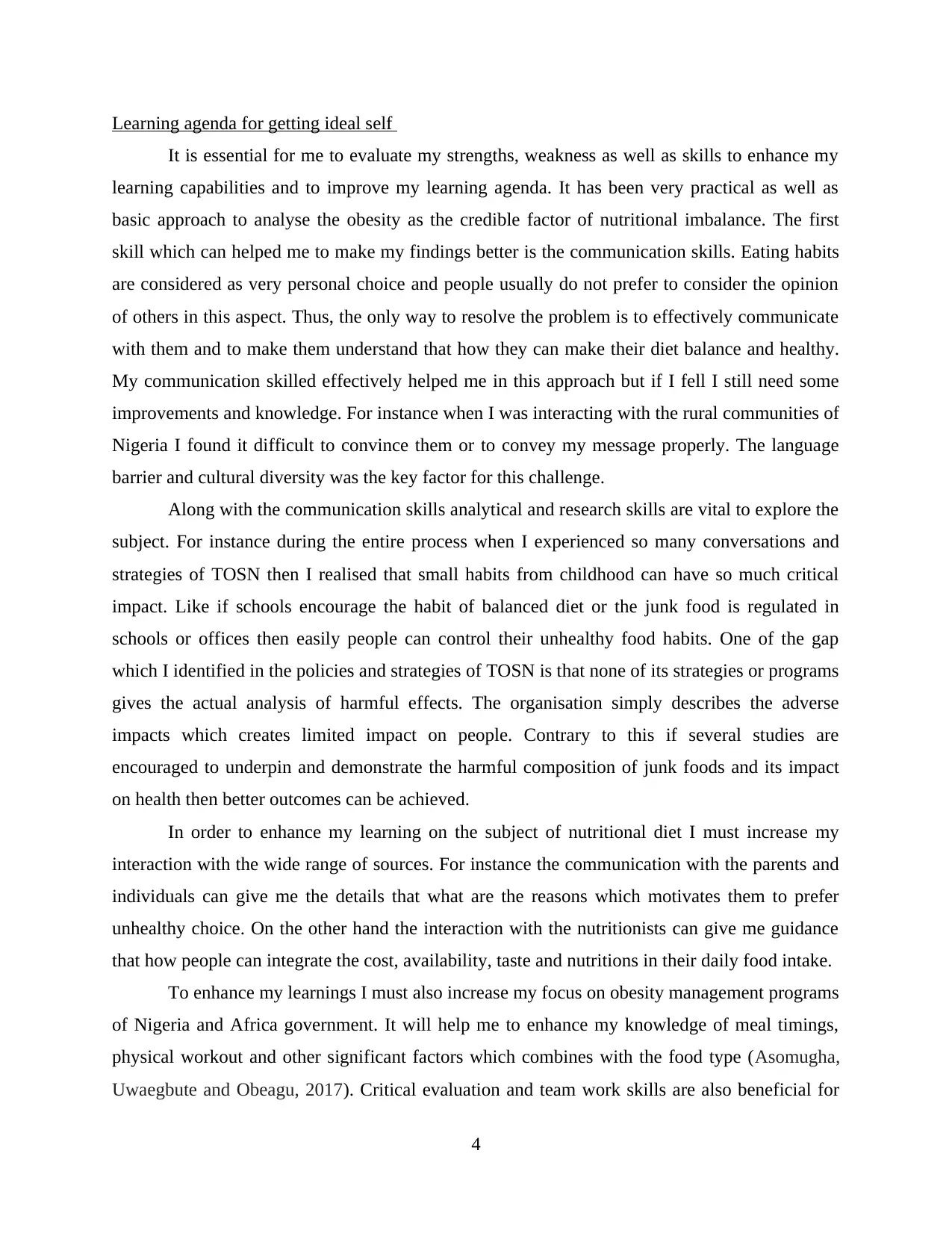
Learning agenda for getting ideal self
It is essential for me to evaluate my strengths, weakness as well as skills to enhance my
learning capabilities and to improve my learning agenda. It has been very practical as well as
basic approach to analyse the obesity as the credible factor of nutritional imbalance. The first
skill which can helped me to make my findings better is the communication skills. Eating habits
are considered as very personal choice and people usually do not prefer to consider the opinion
of others in this aspect. Thus, the only way to resolve the problem is to effectively communicate
with them and to make them understand that how they can make their diet balance and healthy.
My communication skilled effectively helped me in this approach but if I fell I still need some
improvements and knowledge. For instance when I was interacting with the rural communities of
Nigeria I found it difficult to convince them or to convey my message properly. The language
barrier and cultural diversity was the key factor for this challenge.
Along with the communication skills analytical and research skills are vital to explore the
subject. For instance during the entire process when I experienced so many conversations and
strategies of TOSN then I realised that small habits from childhood can have so much critical
impact. Like if schools encourage the habit of balanced diet or the junk food is regulated in
schools or offices then easily people can control their unhealthy food habits. One of the gap
which I identified in the policies and strategies of TOSN is that none of its strategies or programs
gives the actual analysis of harmful effects. The organisation simply describes the adverse
impacts which creates limited impact on people. Contrary to this if several studies are
encouraged to underpin and demonstrate the harmful composition of junk foods and its impact
on health then better outcomes can be achieved.
In order to enhance my learning on the subject of nutritional diet I must increase my
interaction with the wide range of sources. For instance the communication with the parents and
individuals can give me the details that what are the reasons which motivates them to prefer
unhealthy choice. On the other hand the interaction with the nutritionists can give me guidance
that how people can integrate the cost, availability, taste and nutritions in their daily food intake.
To enhance my learnings I must also increase my focus on obesity management programs
of Nigeria and Africa government. It will help me to enhance my knowledge of meal timings,
physical workout and other significant factors which combines with the food type (Asomugha,
Uwaegbute and Obeagu, 2017). Critical evaluation and team work skills are also beneficial for
4
It is essential for me to evaluate my strengths, weakness as well as skills to enhance my
learning capabilities and to improve my learning agenda. It has been very practical as well as
basic approach to analyse the obesity as the credible factor of nutritional imbalance. The first
skill which can helped me to make my findings better is the communication skills. Eating habits
are considered as very personal choice and people usually do not prefer to consider the opinion
of others in this aspect. Thus, the only way to resolve the problem is to effectively communicate
with them and to make them understand that how they can make their diet balance and healthy.
My communication skilled effectively helped me in this approach but if I fell I still need some
improvements and knowledge. For instance when I was interacting with the rural communities of
Nigeria I found it difficult to convince them or to convey my message properly. The language
barrier and cultural diversity was the key factor for this challenge.
Along with the communication skills analytical and research skills are vital to explore the
subject. For instance during the entire process when I experienced so many conversations and
strategies of TOSN then I realised that small habits from childhood can have so much critical
impact. Like if schools encourage the habit of balanced diet or the junk food is regulated in
schools or offices then easily people can control their unhealthy food habits. One of the gap
which I identified in the policies and strategies of TOSN is that none of its strategies or programs
gives the actual analysis of harmful effects. The organisation simply describes the adverse
impacts which creates limited impact on people. Contrary to this if several studies are
encouraged to underpin and demonstrate the harmful composition of junk foods and its impact
on health then better outcomes can be achieved.
In order to enhance my learning on the subject of nutritional diet I must increase my
interaction with the wide range of sources. For instance the communication with the parents and
individuals can give me the details that what are the reasons which motivates them to prefer
unhealthy choice. On the other hand the interaction with the nutritionists can give me guidance
that how people can integrate the cost, availability, taste and nutritions in their daily food intake.
To enhance my learnings I must also increase my focus on obesity management programs
of Nigeria and Africa government. It will help me to enhance my knowledge of meal timings,
physical workout and other significant factors which combines with the food type (Asomugha,
Uwaegbute and Obeagu, 2017). Critical evaluation and team work skills are also beneficial for
4
⊘ This is a preview!⊘
Do you want full access?
Subscribe today to unlock all pages.

Trusted by 1+ million students worldwide
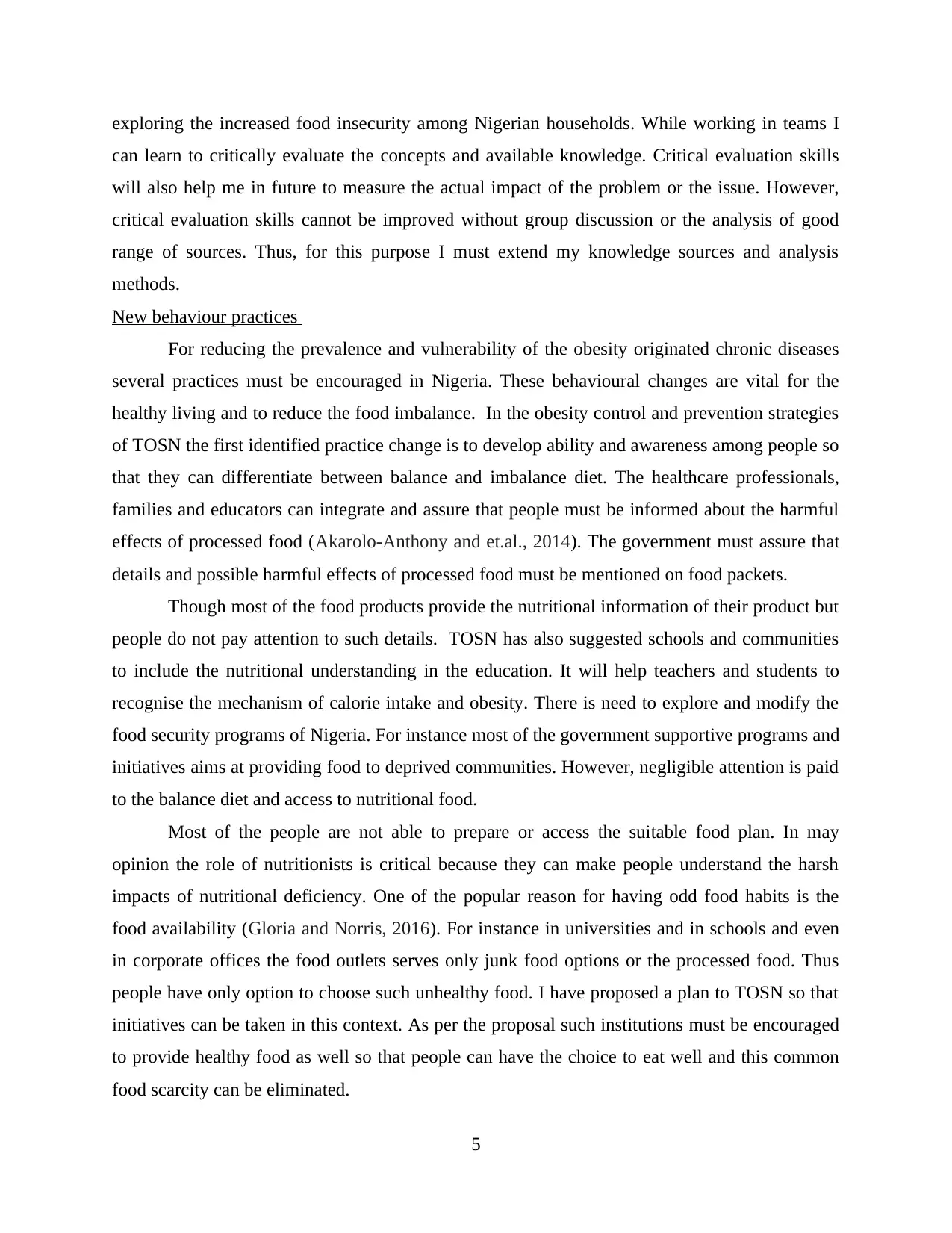
exploring the increased food insecurity among Nigerian households. While working in teams I
can learn to critically evaluate the concepts and available knowledge. Critical evaluation skills
will also help me in future to measure the actual impact of the problem or the issue. However,
critical evaluation skills cannot be improved without group discussion or the analysis of good
range of sources. Thus, for this purpose I must extend my knowledge sources and analysis
methods.
New behaviour practices
For reducing the prevalence and vulnerability of the obesity originated chronic diseases
several practices must be encouraged in Nigeria. These behavioural changes are vital for the
healthy living and to reduce the food imbalance. In the obesity control and prevention strategies
of TOSN the first identified practice change is to develop ability and awareness among people so
that they can differentiate between balance and imbalance diet. The healthcare professionals,
families and educators can integrate and assure that people must be informed about the harmful
effects of processed food (Akarolo-Anthony and et.al., 2014). The government must assure that
details and possible harmful effects of processed food must be mentioned on food packets.
Though most of the food products provide the nutritional information of their product but
people do not pay attention to such details. TOSN has also suggested schools and communities
to include the nutritional understanding in the education. It will help teachers and students to
recognise the mechanism of calorie intake and obesity. There is need to explore and modify the
food security programs of Nigeria. For instance most of the government supportive programs and
initiatives aims at providing food to deprived communities. However, negligible attention is paid
to the balance diet and access to nutritional food.
Most of the people are not able to prepare or access the suitable food plan. In may
opinion the role of nutritionists is critical because they can make people understand the harsh
impacts of nutritional deficiency. One of the popular reason for having odd food habits is the
food availability (Gloria and Norris, 2016). For instance in universities and in schools and even
in corporate offices the food outlets serves only junk food options or the processed food. Thus
people have only option to choose such unhealthy food. I have proposed a plan to TOSN so that
initiatives can be taken in this context. As per the proposal such institutions must be encouraged
to provide healthy food as well so that people can have the choice to eat well and this common
food scarcity can be eliminated.
5
can learn to critically evaluate the concepts and available knowledge. Critical evaluation skills
will also help me in future to measure the actual impact of the problem or the issue. However,
critical evaluation skills cannot be improved without group discussion or the analysis of good
range of sources. Thus, for this purpose I must extend my knowledge sources and analysis
methods.
New behaviour practices
For reducing the prevalence and vulnerability of the obesity originated chronic diseases
several practices must be encouraged in Nigeria. These behavioural changes are vital for the
healthy living and to reduce the food imbalance. In the obesity control and prevention strategies
of TOSN the first identified practice change is to develop ability and awareness among people so
that they can differentiate between balance and imbalance diet. The healthcare professionals,
families and educators can integrate and assure that people must be informed about the harmful
effects of processed food (Akarolo-Anthony and et.al., 2014). The government must assure that
details and possible harmful effects of processed food must be mentioned on food packets.
Though most of the food products provide the nutritional information of their product but
people do not pay attention to such details. TOSN has also suggested schools and communities
to include the nutritional understanding in the education. It will help teachers and students to
recognise the mechanism of calorie intake and obesity. There is need to explore and modify the
food security programs of Nigeria. For instance most of the government supportive programs and
initiatives aims at providing food to deprived communities. However, negligible attention is paid
to the balance diet and access to nutritional food.
Most of the people are not able to prepare or access the suitable food plan. In may
opinion the role of nutritionists is critical because they can make people understand the harsh
impacts of nutritional deficiency. One of the popular reason for having odd food habits is the
food availability (Gloria and Norris, 2016). For instance in universities and in schools and even
in corporate offices the food outlets serves only junk food options or the processed food. Thus
people have only option to choose such unhealthy food. I have proposed a plan to TOSN so that
initiatives can be taken in this context. As per the proposal such institutions must be encouraged
to provide healthy food as well so that people can have the choice to eat well and this common
food scarcity can be eliminated.
5
Paraphrase This Document
Need a fresh take? Get an instant paraphrase of this document with our AI Paraphraser
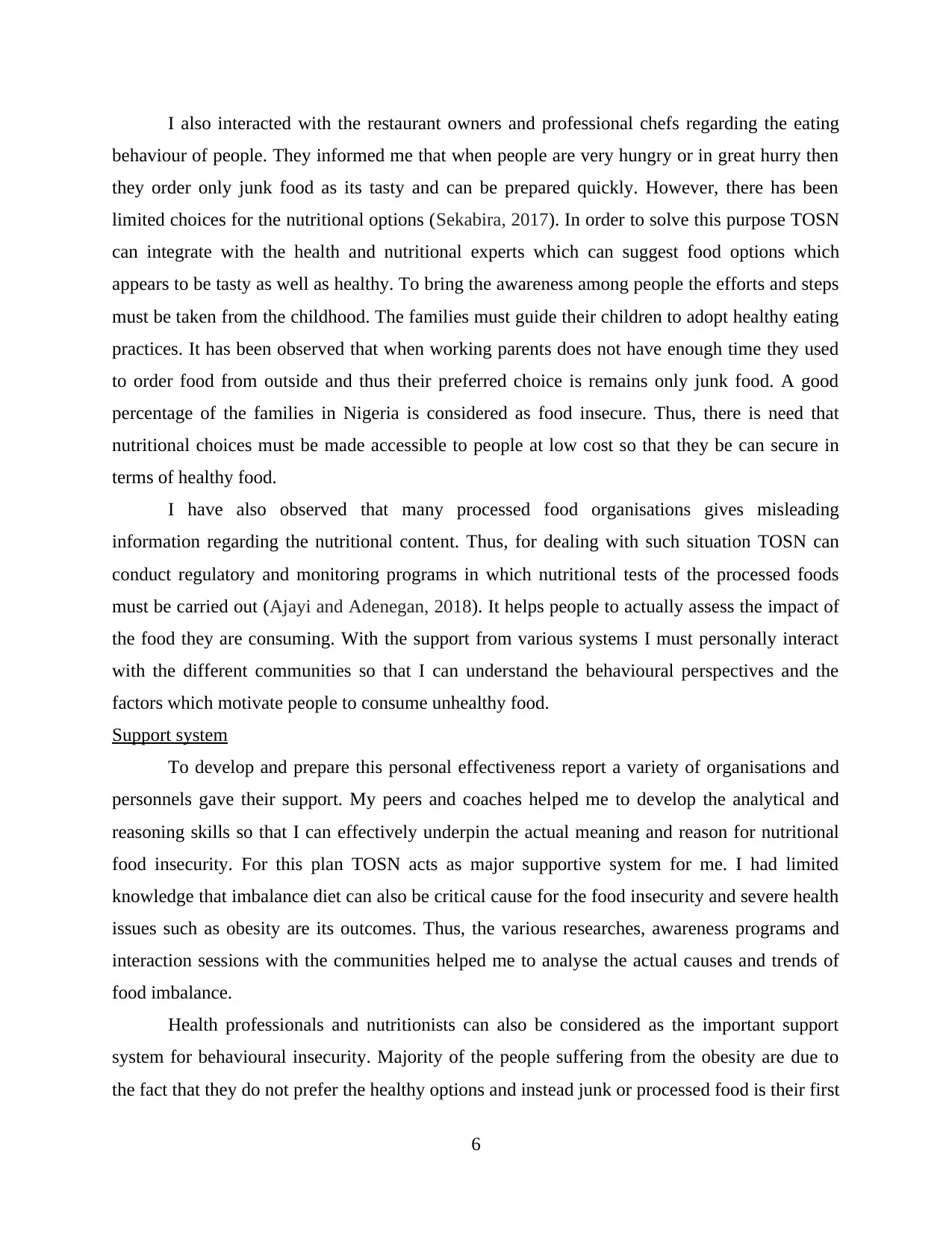
I also interacted with the restaurant owners and professional chefs regarding the eating
behaviour of people. They informed me that when people are very hungry or in great hurry then
they order only junk food as its tasty and can be prepared quickly. However, there has been
limited choices for the nutritional options (Sekabira, 2017). In order to solve this purpose TOSN
can integrate with the health and nutritional experts which can suggest food options which
appears to be tasty as well as healthy. To bring the awareness among people the efforts and steps
must be taken from the childhood. The families must guide their children to adopt healthy eating
practices. It has been observed that when working parents does not have enough time they used
to order food from outside and thus their preferred choice is remains only junk food. A good
percentage of the families in Nigeria is considered as food insecure. Thus, there is need that
nutritional choices must be made accessible to people at low cost so that they be can secure in
terms of healthy food.
I have also observed that many processed food organisations gives misleading
information regarding the nutritional content. Thus, for dealing with such situation TOSN can
conduct regulatory and monitoring programs in which nutritional tests of the processed foods
must be carried out (Ajayi and Adenegan, 2018). It helps people to actually assess the impact of
the food they are consuming. With the support from various systems I must personally interact
with the different communities so that I can understand the behavioural perspectives and the
factors which motivate people to consume unhealthy food.
Support system
To develop and prepare this personal effectiveness report a variety of organisations and
personnels gave their support. My peers and coaches helped me to develop the analytical and
reasoning skills so that I can effectively underpin the actual meaning and reason for nutritional
food insecurity. For this plan TOSN acts as major supportive system for me. I had limited
knowledge that imbalance diet can also be critical cause for the food insecurity and severe health
issues such as obesity are its outcomes. Thus, the various researches, awareness programs and
interaction sessions with the communities helped me to analyse the actual causes and trends of
food imbalance.
Health professionals and nutritionists can also be considered as the important support
system for behavioural insecurity. Majority of the people suffering from the obesity are due to
the fact that they do not prefer the healthy options and instead junk or processed food is their first
6
behaviour of people. They informed me that when people are very hungry or in great hurry then
they order only junk food as its tasty and can be prepared quickly. However, there has been
limited choices for the nutritional options (Sekabira, 2017). In order to solve this purpose TOSN
can integrate with the health and nutritional experts which can suggest food options which
appears to be tasty as well as healthy. To bring the awareness among people the efforts and steps
must be taken from the childhood. The families must guide their children to adopt healthy eating
practices. It has been observed that when working parents does not have enough time they used
to order food from outside and thus their preferred choice is remains only junk food. A good
percentage of the families in Nigeria is considered as food insecure. Thus, there is need that
nutritional choices must be made accessible to people at low cost so that they be can secure in
terms of healthy food.
I have also observed that many processed food organisations gives misleading
information regarding the nutritional content. Thus, for dealing with such situation TOSN can
conduct regulatory and monitoring programs in which nutritional tests of the processed foods
must be carried out (Ajayi and Adenegan, 2018). It helps people to actually assess the impact of
the food they are consuming. With the support from various systems I must personally interact
with the different communities so that I can understand the behavioural perspectives and the
factors which motivate people to consume unhealthy food.
Support system
To develop and prepare this personal effectiveness report a variety of organisations and
personnels gave their support. My peers and coaches helped me to develop the analytical and
reasoning skills so that I can effectively underpin the actual meaning and reason for nutritional
food insecurity. For this plan TOSN acts as major supportive system for me. I had limited
knowledge that imbalance diet can also be critical cause for the food insecurity and severe health
issues such as obesity are its outcomes. Thus, the various researches, awareness programs and
interaction sessions with the communities helped me to analyse the actual causes and trends of
food imbalance.
Health professionals and nutritionists can also be considered as the important support
system for behavioural insecurity. Majority of the people suffering from the obesity are due to
the fact that they do not prefer the healthy options and instead junk or processed food is their first
6
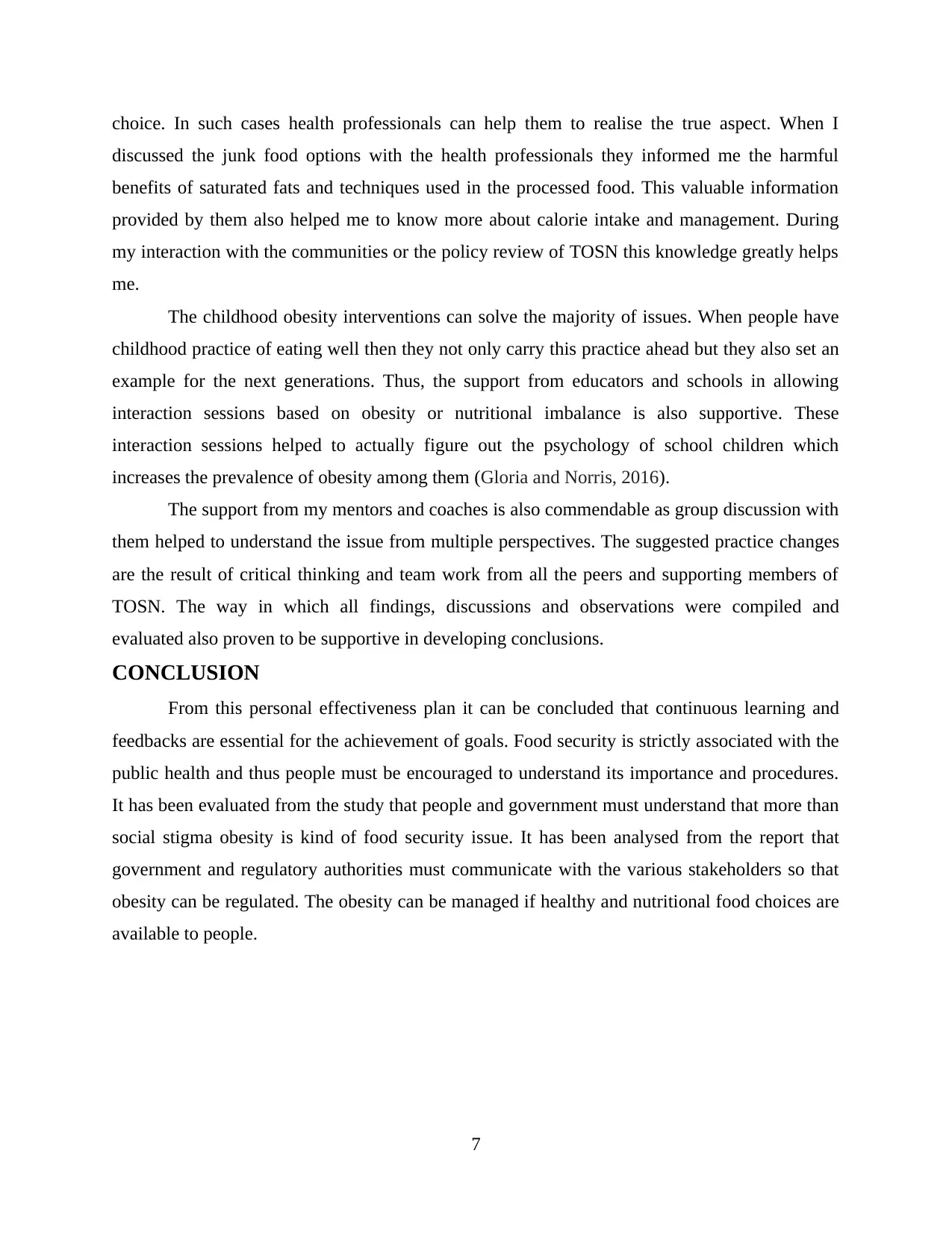
choice. In such cases health professionals can help them to realise the true aspect. When I
discussed the junk food options with the health professionals they informed me the harmful
benefits of saturated fats and techniques used in the processed food. This valuable information
provided by them also helped me to know more about calorie intake and management. During
my interaction with the communities or the policy review of TOSN this knowledge greatly helps
me.
The childhood obesity interventions can solve the majority of issues. When people have
childhood practice of eating well then they not only carry this practice ahead but they also set an
example for the next generations. Thus, the support from educators and schools in allowing
interaction sessions based on obesity or nutritional imbalance is also supportive. These
interaction sessions helped to actually figure out the psychology of school children which
increases the prevalence of obesity among them (Gloria and Norris, 2016).
The support from my mentors and coaches is also commendable as group discussion with
them helped to understand the issue from multiple perspectives. The suggested practice changes
are the result of critical thinking and team work from all the peers and supporting members of
TOSN. The way in which all findings, discussions and observations were compiled and
evaluated also proven to be supportive in developing conclusions.
CONCLUSION
From this personal effectiveness plan it can be concluded that continuous learning and
feedbacks are essential for the achievement of goals. Food security is strictly associated with the
public health and thus people must be encouraged to understand its importance and procedures.
It has been evaluated from the study that people and government must understand that more than
social stigma obesity is kind of food security issue. It has been analysed from the report that
government and regulatory authorities must communicate with the various stakeholders so that
obesity can be regulated. The obesity can be managed if healthy and nutritional food choices are
available to people.
7
discussed the junk food options with the health professionals they informed me the harmful
benefits of saturated fats and techniques used in the processed food. This valuable information
provided by them also helped me to know more about calorie intake and management. During
my interaction with the communities or the policy review of TOSN this knowledge greatly helps
me.
The childhood obesity interventions can solve the majority of issues. When people have
childhood practice of eating well then they not only carry this practice ahead but they also set an
example for the next generations. Thus, the support from educators and schools in allowing
interaction sessions based on obesity or nutritional imbalance is also supportive. These
interaction sessions helped to actually figure out the psychology of school children which
increases the prevalence of obesity among them (Gloria and Norris, 2016).
The support from my mentors and coaches is also commendable as group discussion with
them helped to understand the issue from multiple perspectives. The suggested practice changes
are the result of critical thinking and team work from all the peers and supporting members of
TOSN. The way in which all findings, discussions and observations were compiled and
evaluated also proven to be supportive in developing conclusions.
CONCLUSION
From this personal effectiveness plan it can be concluded that continuous learning and
feedbacks are essential for the achievement of goals. Food security is strictly associated with the
public health and thus people must be encouraged to understand its importance and procedures.
It has been evaluated from the study that people and government must understand that more than
social stigma obesity is kind of food security issue. It has been analysed from the report that
government and regulatory authorities must communicate with the various stakeholders so that
obesity can be regulated. The obesity can be managed if healthy and nutritional food choices are
available to people.
7
⊘ This is a preview!⊘
Do you want full access?
Subscribe today to unlock all pages.

Trusted by 1+ million students worldwide
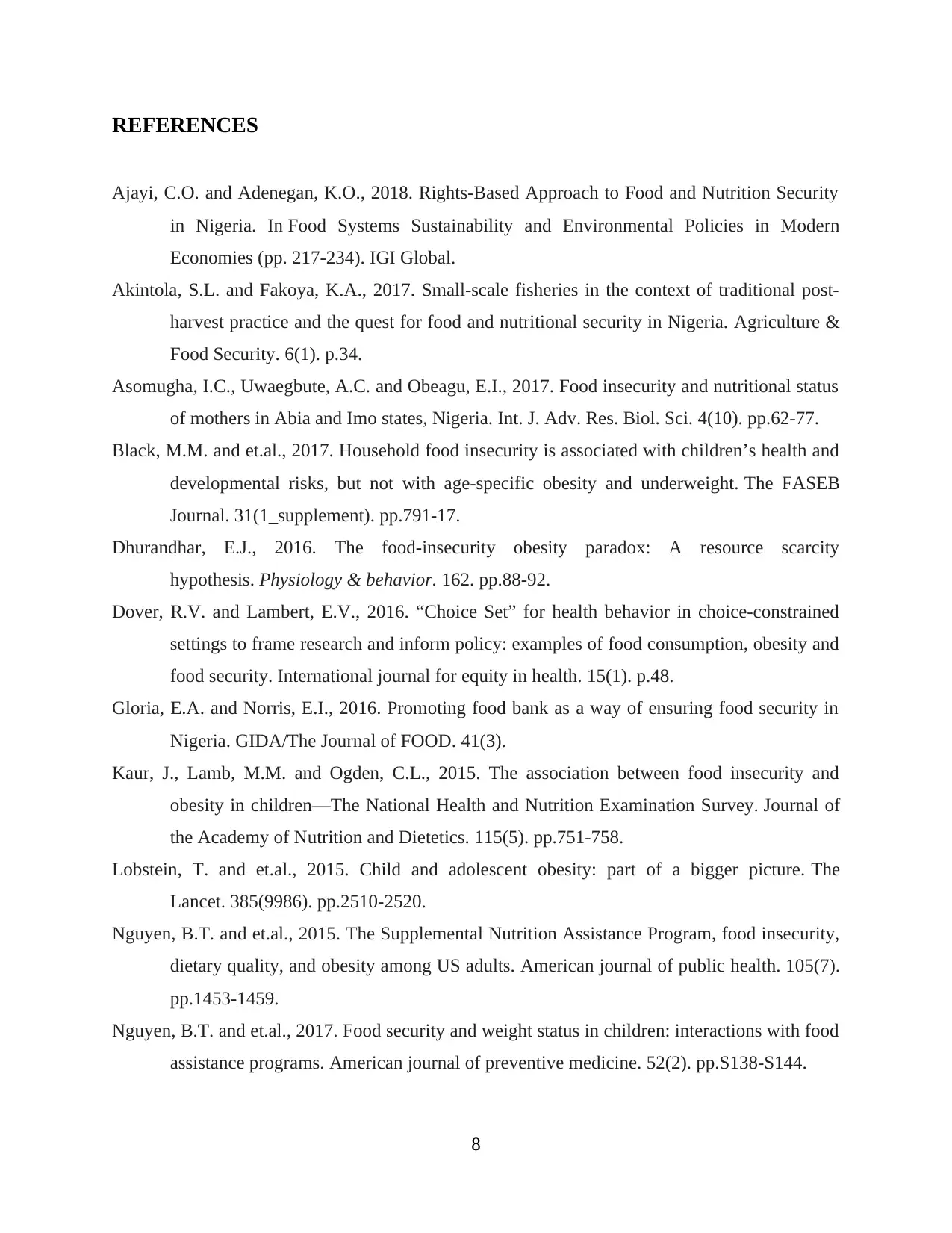
REFERENCES
Ajayi, C.O. and Adenegan, K.O., 2018. Rights-Based Approach to Food and Nutrition Security
in Nigeria. In Food Systems Sustainability and Environmental Policies in Modern
Economies (pp. 217-234). IGI Global.
Akintola, S.L. and Fakoya, K.A., 2017. Small-scale fisheries in the context of traditional post-
harvest practice and the quest for food and nutritional security in Nigeria. Agriculture &
Food Security. 6(1). p.34.
Asomugha, I.C., Uwaegbute, A.C. and Obeagu, E.I., 2017. Food insecurity and nutritional status
of mothers in Abia and Imo states, Nigeria. Int. J. Adv. Res. Biol. Sci. 4(10). pp.62-77.
Black, M.M. and et.al., 2017. Household food insecurity is associated with children’s health and
developmental risks, but not with age-specific obesity and underweight. The FASEB
Journal. 31(1_supplement). pp.791-17.
Dhurandhar, E.J., 2016. The food-insecurity obesity paradox: A resource scarcity
hypothesis. Physiology & behavior. 162. pp.88-92.
Dover, R.V. and Lambert, E.V., 2016. “Choice Set” for health behavior in choice-constrained
settings to frame research and inform policy: examples of food consumption, obesity and
food security. International journal for equity in health. 15(1). p.48.
Gloria, E.A. and Norris, E.I., 2016. Promoting food bank as a way of ensuring food security in
Nigeria. GIDA/The Journal of FOOD. 41(3).
Kaur, J., Lamb, M.M. and Ogden, C.L., 2015. The association between food insecurity and
obesity in children—The National Health and Nutrition Examination Survey. Journal of
the Academy of Nutrition and Dietetics. 115(5). pp.751-758.
Lobstein, T. and et.al., 2015. Child and adolescent obesity: part of a bigger picture. The
Lancet. 385(9986). pp.2510-2520.
Nguyen, B.T. and et.al., 2015. The Supplemental Nutrition Assistance Program, food insecurity,
dietary quality, and obesity among US adults. American journal of public health. 105(7).
pp.1453-1459.
Nguyen, B.T. and et.al., 2017. Food security and weight status in children: interactions with food
assistance programs. American journal of preventive medicine. 52(2). pp.S138-S144.
8
Ajayi, C.O. and Adenegan, K.O., 2018. Rights-Based Approach to Food and Nutrition Security
in Nigeria. In Food Systems Sustainability and Environmental Policies in Modern
Economies (pp. 217-234). IGI Global.
Akintola, S.L. and Fakoya, K.A., 2017. Small-scale fisheries in the context of traditional post-
harvest practice and the quest for food and nutritional security in Nigeria. Agriculture &
Food Security. 6(1). p.34.
Asomugha, I.C., Uwaegbute, A.C. and Obeagu, E.I., 2017. Food insecurity and nutritional status
of mothers in Abia and Imo states, Nigeria. Int. J. Adv. Res. Biol. Sci. 4(10). pp.62-77.
Black, M.M. and et.al., 2017. Household food insecurity is associated with children’s health and
developmental risks, but not with age-specific obesity and underweight. The FASEB
Journal. 31(1_supplement). pp.791-17.
Dhurandhar, E.J., 2016. The food-insecurity obesity paradox: A resource scarcity
hypothesis. Physiology & behavior. 162. pp.88-92.
Dover, R.V. and Lambert, E.V., 2016. “Choice Set” for health behavior in choice-constrained
settings to frame research and inform policy: examples of food consumption, obesity and
food security. International journal for equity in health. 15(1). p.48.
Gloria, E.A. and Norris, E.I., 2016. Promoting food bank as a way of ensuring food security in
Nigeria. GIDA/The Journal of FOOD. 41(3).
Kaur, J., Lamb, M.M. and Ogden, C.L., 2015. The association between food insecurity and
obesity in children—The National Health and Nutrition Examination Survey. Journal of
the Academy of Nutrition and Dietetics. 115(5). pp.751-758.
Lobstein, T. and et.al., 2015. Child and adolescent obesity: part of a bigger picture. The
Lancet. 385(9986). pp.2510-2520.
Nguyen, B.T. and et.al., 2015. The Supplemental Nutrition Assistance Program, food insecurity,
dietary quality, and obesity among US adults. American journal of public health. 105(7).
pp.1453-1459.
Nguyen, B.T. and et.al., 2017. Food security and weight status in children: interactions with food
assistance programs. American journal of preventive medicine. 52(2). pp.S138-S144.
8
Paraphrase This Document
Need a fresh take? Get an instant paraphrase of this document with our AI Paraphraser
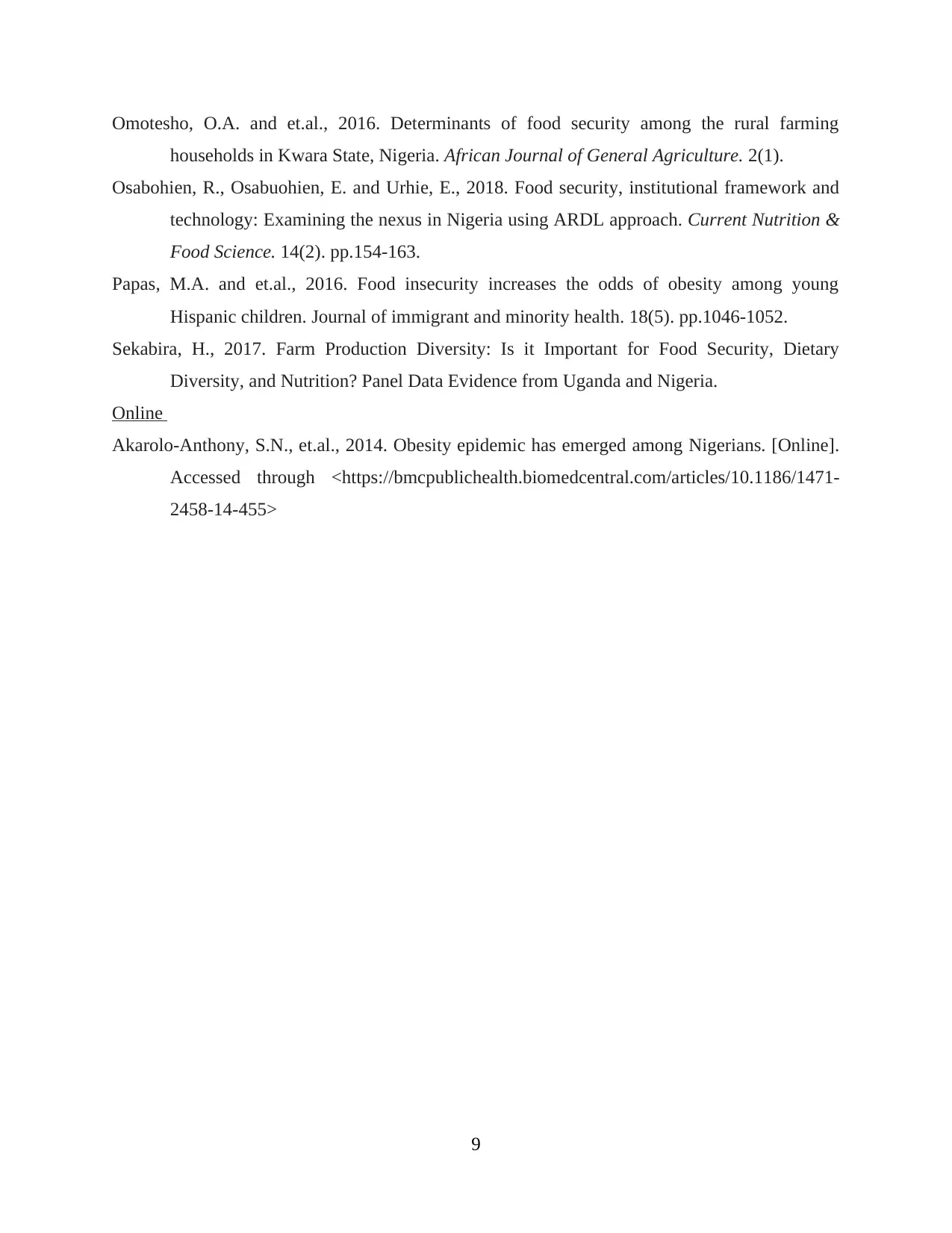
Omotesho, O.A. and et.al., 2016. Determinants of food security among the rural farming
households in Kwara State, Nigeria. African Journal of General Agriculture. 2(1).
Osabohien, R., Osabuohien, E. and Urhie, E., 2018. Food security, institutional framework and
technology: Examining the nexus in Nigeria using ARDL approach. Current Nutrition &
Food Science. 14(2). pp.154-163.
Papas, M.A. and et.al., 2016. Food insecurity increases the odds of obesity among young
Hispanic children. Journal of immigrant and minority health. 18(5). pp.1046-1052.
Sekabira, H., 2017. Farm Production Diversity: Is it Important for Food Security, Dietary
Diversity, and Nutrition? Panel Data Evidence from Uganda and Nigeria.
Online
Akarolo-Anthony, S.N., et.al., 2014. Obesity epidemic has emerged among Nigerians. [Online].
Accessed through <https://bmcpublichealth.biomedcentral.com/articles/10.1186/1471-
2458-14-455>
9
households in Kwara State, Nigeria. African Journal of General Agriculture. 2(1).
Osabohien, R., Osabuohien, E. and Urhie, E., 2018. Food security, institutional framework and
technology: Examining the nexus in Nigeria using ARDL approach. Current Nutrition &
Food Science. 14(2). pp.154-163.
Papas, M.A. and et.al., 2016. Food insecurity increases the odds of obesity among young
Hispanic children. Journal of immigrant and minority health. 18(5). pp.1046-1052.
Sekabira, H., 2017. Farm Production Diversity: Is it Important for Food Security, Dietary
Diversity, and Nutrition? Panel Data Evidence from Uganda and Nigeria.
Online
Akarolo-Anthony, S.N., et.al., 2014. Obesity epidemic has emerged among Nigerians. [Online].
Accessed through <https://bmcpublichealth.biomedcentral.com/articles/10.1186/1471-
2458-14-455>
9

10
⊘ This is a preview!⊘
Do you want full access?
Subscribe today to unlock all pages.

Trusted by 1+ million students worldwide
1 out of 15
Related Documents
Your All-in-One AI-Powered Toolkit for Academic Success.
+13062052269
info@desklib.com
Available 24*7 on WhatsApp / Email
![[object Object]](/_next/static/media/star-bottom.7253800d.svg)
Unlock your academic potential
Copyright © 2020–2025 A2Z Services. All Rights Reserved. Developed and managed by ZUCOL.





